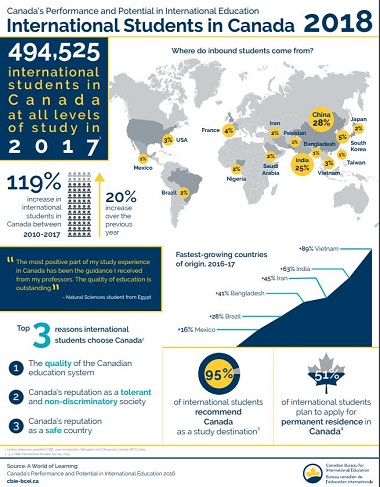
Graphic from the Canadian Bureau for International Education.
This article from the Lausanne Movement explains why it is so important to be hospitable to visiting students, and how ISMC has come to have partners all around the world.
The event that launched International Student Ministry (ISM) on to the global scene was the Lausanne 2004 Forum in Thailand, where Diaspora Ministry and International Student Ministry were introduced as a new strategic ministry special interest group.
The Lausanne Occasional Paper 55, Diasporas and International Students: The New People Next Door,produced by the joint Diaspora and ISM groups at the Forum, authenticated ISM across the world as a significant and strategic mission.[1]
The first worldwide gathering of ISM leaders was convened in September 2017 as the Lausanne ISM Global Leadership Forum: Charlotte ’17, with over 100 leaders from 70 organizations and 23 countries.[2]
The stage is now set for the ISM movement to grow deeper roots throughout the world. We all need to be a part of it, as the growth of internationally mobile students continues, but the growth of ministers and ministries among international students continues to lag behind.
Growing mission field
God is sending the mission field to our campuses in the form of five million international students globally today, and a projected eight million by 2025. Europe and North America have been the primary destination regions for international students during the previous six decades, but the Asia-Pacific region is rapidly attracting foreign students because several nations have national goals for recruiting lucrative students from abroad, for example:
| Australia: 720,000 students by 2025 (500,000 in 2017) | |
| China: 500,000 by 2020 (407,000 in 2015) | |
| Malaysia: 250,000 students by 2025 | |
| Taiwan: 130,000 by 2020 | |
| Japan: 300,000 by 2020 (240,000 in 2016) |
[The target for Canada was 450,000 students by 2022, but that number had already been exceeded by last year. For the latest stats go here.]
Strategic vision
During my 40 years of mobilising the church for ISM, I have adhered to the foundational need to share the biblical commands to practice hospitality and welcome the foreigner, and also the multi-faceted and mutual blessings of ministry among international students. Why? Because without a vision there will not be any engagement.
As Jesus did with the crowds in Matthew 9:36-38, a pastor or ministry / mission leader needs to ‘see’ the providential presence of international students (the world’s future influencers) studying on their campuses in order to feel compassion or conviction to extend God’s hospitality to the lost sheep from many nations.[3] Although the strategic importance of ISM is obvious, church and mission leaderships have often been oblivious to it.
Why engage with international students?
In 1975, a former international student gave a powerful message at the World Missions Conference of Park Street Church in Boston. That message, ‘The Great Blind-Spot in Missions Today’, was about ministry among international students, and how the church often failed to see the tremendous potential for world missions to and through foreign scholars.
Opportunities for mission
The blind-spot has been gradually diminishing over the last four decades as the church gains a vision about the strategic value of ISM, and a better understanding of the opportunities for mission among international students and scholars:
- These students are already here and now, on our campuses, in our communities, and in our churches; we do not need to wait to go somewhere, over there, in the future to participate in the Great Commission.
- They are sufficiently conversant in our language to study in our schools, or may be in a language institute to enhance the learning of our language. They would often appreciate the opportunity to practice our language with us (and while we do not need to be fluent in their native tongue, we could have them teach us some of their language). Volunteer language conversation is a wonderful service that naturally builds friendships to share about life and faith.
- They are generally willing to learn about our culture, history, and country and may wish to have host-country friends who can be cultural mentors.
- They are often more open, curious, and responsive to learning about Jesus while living abroad.
- They are freer to consider the gospel if they are away from a restrictive society, culture, and religion that is hostile towards Christianity.
- They are sometimes from unreached people-groups where the church does not yet exist or is in an infant stage.
- They are appreciative of hospitality and welcome relationships of mutual intercultural interaction, as well as the intergenerational social context of host-families where younger children, parents, and grandparents are valued along with peer-age adults.

Impact of international students
International students are potential world leaders (politically and in their professions), nation builders, and transformation agents.
Furthermore, Christian returnees can play significant roles in establishing the universal Church; many of the senior evangelical leaders in Malaysia and Singapore in recent years were students in Australia in the 1960s and 1970s.
John Sung came to Christ in the US in the mid-1920s and returned to China as an evangelist; revival in China spread like wildfire. Bakht Singh, a Sikh, was attracted to Christ over a span of months while studying in the UK and then in Canada. He received Christ and returned to be an evangelist to India, just like John Sung in China and East Asia: ‘Bakht Singh’s New Testament church planting model multiplied to over 500 congregations in India and 200 congregations in Pakistan, plus a number in Europe and North America.’[4]
Informants and instructors
International students can also serve as ‘informants’ and ‘instructors’ that advance the mission movement. Two mega shifts in missions in the nineteenth and twentieth century were spurred on by the informants role provided by international students:
 During the D.L. Moody student conference at Mount Hermon, Massachusetts in 1886, a special ‘meeting of the 10 nations’ was held in which students from 10 countries shared briefly about the need for missionaries in their part of the world. Those ‘Macedonian calls’ fueled a response that resulted in the formation in 1888 of the Student Volunteer Movement for Foreign Missions which produced over 20,500 missionaries in the field.[5]
During the D.L. Moody student conference at Mount Hermon, Massachusetts in 1886, a special ‘meeting of the 10 nations’ was held in which students from 10 countries shared briefly about the need for missionaries in their part of the world. Those ‘Macedonian calls’ fueled a response that resulted in the formation in 1888 of the Student Volunteer Movement for Foreign Missions which produced over 20,500 missionaries in the field.[5]
 Dr. Ralph D. Winter’s development of the ‘hidden peoples’ / unreached peoples concept in relation to the unfinished task of world evangelisation affected a paradigm shift in mission understanding and strategic planning.[6] What contributed to his emerging people-groups worldview? He told me that the Fuller Seminary School of World Missions (where he taught) had ‘10 students and 100 faculty,’ explaining that he was the student learning about church growth and evangelism among the world’s diverse cultural sub-groups from ‘100 teachers’ – his international student informants.
Dr. Ralph D. Winter’s development of the ‘hidden peoples’ / unreached peoples concept in relation to the unfinished task of world evangelisation affected a paradigm shift in mission understanding and strategic planning.[6] What contributed to his emerging people-groups worldview? He told me that the Fuller Seminary School of World Missions (where he taught) had ‘10 students and 100 faculty,’ explaining that he was the student learning about church growth and evangelism among the world’s diverse cultural sub-groups from ‘100 teachers’ – his international student informants.
International students have played a tremendous role in the advance of missions understanding and needs, and will continue to be valuable instructors, if we are willing to listen and learn from them.
They are also gifts of God to the host nation and church: an African seminary student was instrumental in the conversion of an Episcopal priest in the US, who later became a bishop and played a significant role in the evangelical stream within the US Episcopal Church. That stream has flowed into the new Anglican Church in North America (ACNA) denomination, and in turn, there is now significant interest and movement among Anglican mission and church leaders to foster ISM in the ACNA.

ISM in local churches
Local churches are discovering how enriching it is to have a ministry among international students:
- Substantial benefits and significant global impact can be achieved with a very modest ISM budget – high-yield but low (or no) financial cost.
- ISM provides a tangible dimension to a church’s mission vision, with engagement options for the congregation to participate in beyond prayer, member care and financial support of overseas missionaries and ministries.
- A broad range of church members can be involved in ISM, from children to retirees, and utilize their varied gifts for service – hospitality, helping, administration, teaching, mercy, evangelism, leadership, etc.
- Returned or retired missionaries back home are extending their cross-cultural mission service by ministering among international students from the country or cultural-linguistic group they served overseas. We have several missionaries and other returned expatriate government or business people involved regularly in our church-based ISM. Furthermore, mission agencies may recommend or assign their candidates to participate in ISM as a pre-field cross-cultural training and learning experience.
- Many people who have had a desire to serve abroad, but are not able to for various reasons, are having a fruitful ministry with international students from the country or region of the world to which they had intended to go. They are now global missionaries at home, and sometimes in their homes.
- International student friends are ready-made language and cultural teachers for church members going to the students’ countries for long-term or short-term missions, study abroad, work or simply a visit.
- International students may provide critical linkage to ministry/mission in their homeland, either personally after they return home or by giving a positive introduction to, and endorsement of, missionaries to their family, friends, and networks. Returnees could be gatekeepers that open the door for ministry by foreigners in their country.
The reality is that most Christians are not ‘called’ to serve as long-term professional missionaries or as self-supporting ‘tent-maker’ / BAM [business as mission] missionaries in another country. However, staying at home does not mean we cannot engage in cross-cultural, global ministry. ISM is one avenue for participating in world missions at home
Implications and responses
What is your context of ministry, and what next steps could you consider in exploring how your ministry might include ISM in its strategic plan?
If you are a church-based ministry, are there any ISMs in your area with which to collaborate? If not, and you have international students in your community, perhaps your members would volunteer to be ‘host-families / friends’ through the local campus International Student Services office, or language conversation partners with a language learning institute.
If you are a campus-based ministry, how could ISM be promoted among your national students, and perhaps intentionally developed within your campus plans?
If you are a mission agency, should ISM be adopted for your pre-field missionary training of candidates and also as a continuing option for returned and retired missionaries? How might Christian international students contribute as potential informants, mentors and advocates before and after they return home?
Questions about getting involved in ISM, resources and future ISM-related events may be directed to Dr. Yaw Perbi, President of International Student Ministries Canada, and Emma Brewster, SIM International Coordinator for Engaging the University, the new Lausanne ISM Co-Catalysts, at yaw.perbi@ismc.ca and emma.brewster@sim.org respectively.
Endnotes
- Editor’s Note: Downloadable PDF is available at https://www.lausanne.org/content/lop/lop-55. ↑
- Editor’s Note: See https://www.lausanne.org/gatherings/lausanne-ism-global-leadership-forum-charlotte17. ↑
- Editor’s Note: See article by Sam George, entitled, ‘Is God Reviving Europe through Refugees?: Turning the greatest humanitarian crisis of our times into one of the greatest mission opportunities’ in May 2017 issue of Lausanne Global Analysis https://www.lausanne.org/content/lga/2017-05/god-reviving-europe-refugees. ↑
- Jonathan Bonk, ‘Thinking Small: Global Missions and American Churches,’ Missiology (April 2000). ↑
- Editor’s Note: See article by Allen Yeh, entitled, ‘The Future of Mission is from Everyone to Everywhere: a look at polycentric missiology” in this current issue of Lausanne Global Analysis https://www.lausanne.org/content/lga/2018-01/future-mission-everyone-everywhere. ↑
- Editor’s Note: See article by Kent Parks, entitled, ‘Finishing the Remaining 29 Percent of World Evangelization: Disciple-Making Movements as a holistic and radical solution’ in May 2017 issue of Lausanne Global Analysishttps://www.lausanne.org/content/lga/2017-05/finishing-the-remaining-29-of-world-evangelization. ↑
Leiton Edward Chinn has been mobilizing the church for ISM since 1977 and completed a 10 year tenure as Lausanne Catalyst for ISM in 2017. He served as president of the Association of Christians Ministering among Internationals [students] from 1999 – 2008. Leiton is married to Lisa Espineli Chinn, a former National ISM Director of InterVarsity USA, who was an international graduate student from the Philippines at Wheaton Graduate School.
This article originally appeared in the January 2018 issue of Lausanne Global Analysis and is published here with permission. To receive this free bimonthly publication from the Lausanne Movement, subscribe online at www.lausanne.org/analysis.
